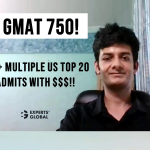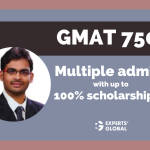Verbatim
Experts’ Global: Hi Parth, thank you for making time for this interview! Could you kindly share your story?
Parth: Sure! My name is Parth Kaushik, and I come from an undergrad background in Computer Science Engineering. I worked at Microsoft for four years after graduating, and thereafter decided to take the MBA leap. With the help of MBA admissions consultants Experts’ Global, I was able to secure admission to the Foster MBA, and graduated therefrom in 2021. Ever since, I have been working at Amazon as a Senior Program Manager in the operations supply chain business and am based in Seattle.
Experts’ Global: In your opinion, what decisions of yours most affected your success?
Parth: I think having the clarity to pursue an MBA right in the second year of my career was beneficial. Further, reaching out to seniors from my undergrad college and colleagues at work who had MBAs as well helped me form my expectations from the program and understand the kind of workload it entails. Using my GMAT prep time to get into a habit of studying and mentally ready myself to return to academics after an extended break was also useful.
Experts’ Global: In hindsight, what mistakes do you think you committed along the way?
Parth: I took my GMAT pretty late, in August in fact, considering that the first round of admissions for my schools of choice opened in September. This is where having an admissions consultant to aid me proved a good choice. I also did not negotiate much for a scholarship after I got my admit, and I initially had the impression that I would only accept a seat at a top ten US MBA. Thankfully, I had the right advisors to help me see reason.
Experts’ Global: About your GMAT prep, what resources did you use and what advice do you have for other candidates?
Parth: The major resource I used was the official material from the GMAT website. Making sure to mark the questions you get wrong and shoring up those concepts is a strategy I would recommend. I prepared for the GMAT over three months, and used a GMAT online course for my convenience. I would also recommend Manhattan Prep’s sentence correction resources.
Experts’ Global: What, according to you, is the frequency and number of mock tests an applicant should take?
Parth: In my experience, applicants should take a mock from the GMAT website right when they begin their prep, to see where they stand. Thereafter, six to seven GMAT practice tests after you are done with your prep would be sufficient. In my case, the last mock that I attempted, five days before my actual exam, was from the GMAT website, and it gave me a good sense of what kind of score I could expect.
Experts’ Global: What would you like to say about your experience with managing the application timeline?
Parth: I applied to ten schools, which made managing the application timeline for each altogether a bit hectic. Researching each school and reaching out to alumni and current students from my targeted program was relatively time-consuming. You have to wait for people to be free, and operate on their timeline since they are doing you a favor. Overall, I learned much about keeping multiple tasks organized.
Experts’ Global: How would you describe your MBA interview experience?
Parth: My interview experience was pretty straightforward. Most panelists wanted to find out about the impact beyond the figures in my resume. Questions about professional failures and challenges were common, as were inquiries about my personal interests and ambitions. Such questions were directed toward figuring out if I fit well into a school’s culture. Interestingly, most interviewers do their best to help applicants feel comfortable and keep things conversational. As long as your MBA interview prep is in place beforehand, you will do fine!
Experts’ Global: How would you describe your time in the MBA?
Parth: I belong to an MBA batch whose terms were largely held online due to the COVID-19 pandemic. However, since I started my MBA in 2019, I did get to spend six months on campus at Foster, which was pretty great. The MBA requires you to juggle your academics, social life, and professional networking. Further, you get to interact with a truly amazing learning community, many of whom can truly broaden your perspective with the stories they have to share.
Experts’ Global: What can you share about the post-MBA job search and what advice do you have for aspirants about the same?
Parth: My job search went relatively smoothly. I spent my first term at school building relationships with professionals from companies that I wished to find jobs at, and thereafter started applying for different positions. Initially, I reached out to professionals in investment banking and consulting and also applied for roles in the two industries, but in the end, I realized that the technology industry was the place for me. However, I wanted a role with strategic implications.
All business schools provide students with considerable career support in terms of resume refinement and workshops on how to ace job interview processes. The good thing is that much of the introspection you do for the MBA interview is transferable to the post-MBA job hunt as well. Overall, do not worry much about your post-MBA employment, and be aware that, quite often, the first job after you complete your degree will be but a stepping stone to exponentially greater things!
Experts’ Global: In your post-MBA journey, how have the pre-application process and the MBA influenced your growth?
Parth: The GMAT prep process boosted my math and reading comprehension skills considerably, and these improved abilities helped me a lot in tackling case studies during the MBA. The MBA itself imbued me with considerable time management and leadership skills. In program management, you are responsible for a lot of moving parts and stakeholder requirements. The MBA experience, with its team-oriented push, already trained me for such contingencies and eased my transition to a role with considerable responsibility after graduation!
Experts’ Global: What common mistakes should all GMAT and MBA aspirants look out for?
Parth: Do not try and work with NGOs casually or complete multiple certifications just to have something to add to your resume and boost your profile. MBA interviewers like to question applicants about their engagements outside work, and you might be caught fumbling trying to explain your impact on an external interest group that you have not really done much for.
Make sure to talk to current students from the schools you are applying to, as they often have the inside track on current events and trends in the school’s life that you can connect to your own experiences through your essays and interview answers. As far as GMAT prep goes, if you are not sure about what GMAT mock vendor to choose, take their free GMAT practice test to see if their offering is of any utility.
Experts’ Global: What would be your final advice for our readers?
Parth: Make sure to enjoy the MBA journey. It often proves to be a transformational experience and allows for great personal growth. Work hard, keep your ambitions and priorities clear, and things will turn out fine for you!
Experts’ Global: Thank you for this illuminating conversation, Parth!
Parth: Absolutely, and I hope I help other aspirants through my answers!







